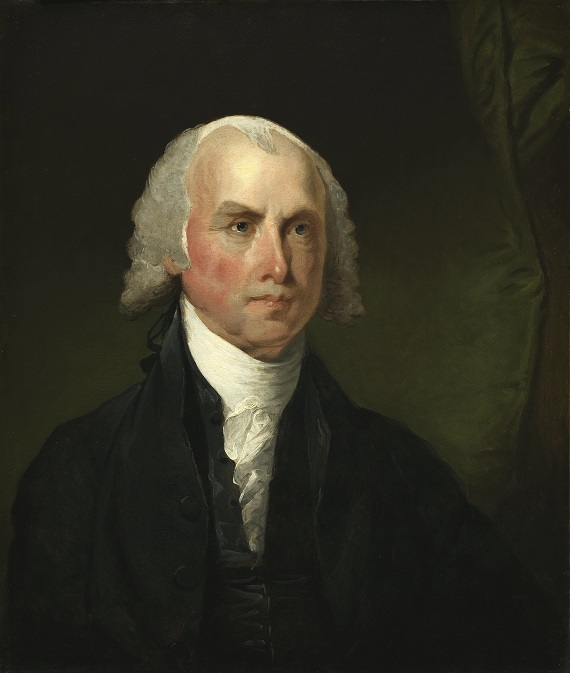In 2015, Todd Horwitz posted an article on on the Ron Paul-sponsored website Voices of Liberty aimed at restoring the definition of liberal. Horwitz explained:
“Today’s liberals are not liberal at all. They are elitists, communists, and socialists that believe that they should dictate how people live. The true liberals are conservatives that try to restore the country to the way the founding fathers envisioned it.”
Adding that “current progressives want to provide basics for individuals to keep them in power, but are not interested in individual rights.”
Perhaps there is no more persuasive evidence of the unmerited coopting of the “liberal” label by Progressives than the relationship between the writings of the poster boy of classical liberalism, John Locke, and the man identified (inaccurately) as the “Father of the Constitution,” James Madison.
Long ago scholars identified the arches and loops of John Locke’s fingerprints on the writings of James Madison. Proof of this influence is often noted in Madison’s restatement of Lockean liberalism in the Federalist Papers, particularly in Federalist, No. 51.
That Madison benefited from Locke’s analysis of the machine of government and its relationship to individual liberty is indisputable, but to describe all Madisonian philosophy as some sort of diluted mimicry of Lockean principles is lazy and incorrect, attributes many see in the behavior of modern liberals with no concept of the historical definition of that philosophy.
Apart from the almost universal ignorance of the core principles of classical liberalism, contemporary self-professed liberals are nearly unanimous in their hostility to the concept of religious liberty, particularly when its exercise encroaches on the “liberal” agenda of exiling religion from the public square.
Madison, it has been said, was a “profoundly original thinker” and “no mere follower of the philosophers.” The design of this article, however, is not to expose the originality of Madison’s thinking; rather it is to note how in regard to his view of religious toleration (a term Madison despised as being, as Thomas Paine said, “not the opposite of intolerance, but the counterfeit of it. Both are despotisms. The one assumes to itself the right of withholding liberty of conscience, the other of granting it.”).
Madison both borrowed from and disagreed with Locke’s liberal opinions written nearly 100 years earlier.
Underlying both works is the understanding that man is a creature of dual nature: He is a curious admixture of elements both spiritual and temporal. As Locke succinctly stated, “But besides their souls which are immortal, men have also their temporal lives here upon the earth.”
Man’s dual nature demands dual allegiances, one to a religious authority and another to a civil authority. Man’s duty of loyalty to God animates his observations of obedience to ecclesiastical law, while his duty of loyalty to a civil magistrate proscribes any behavior contrary to the public weal. That is to say, man, in a state of nature, enters into religious society with one goal: “The worship of God, and by means thereof, the acquisition of eternal life” (Locke); a man enters into society, however, with a different end in view, that of preserving his life, liberty, and property.
Two distinct magistrates rule these two societies. God or his earthly ministers rule religious society and the king, president, or other worldly executive rules civil society.
Man’s truest happiness is to be found, Madison and Locke contend, when the “metes and bounds” of these two realms are guarded and kept free from encroachment on the part of the other. Locke explains:
I esteem it above all things necessary to distinguish exactly the business of civil government from that of religion and to settle the just bounds that lie between the one and the other. If this be not done, there can be no end put to the controversies that will be always arising between those that have, or at least pretend to have, on the one side, a concernment for the interest of men’s souls, and, on the other side, a care of the commonwealth.
“The preservation of a free government requires not merely, that the metes and bounds which separate each department of power be invariably maintained; but more especially that neither of them be suffered to overleap the great barrier which defends the right of the people,” Madison affirmed.
Beyond simply advocating the clear delineation of the spheres of religious and civil authority, Madison and Locke asserted that any effort on the part of the civil magistrate to blur those frontiers was tyrannical and inimical to the cause of liberty: “Just and moderate governments are everywhere quiet, everywhere safe, but oppression raises ferments and makes men struggle to cast off an uneasy and tyrannical yoke,” explained Locke.
“The rulers who are guilty of such encroachment … are tyrants. The people who submit to it are governed by laws made neither by themselves nor by an authority derived from them, and are slaves,” Madison confirmed. Such oppression on the part of the civil government is the surest way to foment sedition and stir rebellion against the usurping government. Locke declared, “There is only one thing which gathers people into seditious commotions and that is oppression.”
Madison agrees and uses the experience of the American War for Independence to explain his position:
It is proper to take alarm at the first experiment on our liberties. We hold this prudent jealousy to be the first duty of Citizens, and one of the noblest characteristics of the late Revolution.
The free men of America did not wait till usurped power had strengthened itself by exercise and entangled the question in precedents. They saw all the consequences in the principle, and they avoided the consequences by denying the principle.
The idea of revolution being justified by the anticipation of oppression was earlier espoused by Thomas Jefferson in his “Declaration of the Causes and Necessity for Taking Up Arms.”
Even in Madison’s and Locke’s expression of their personal faith, they evinced an attitude that would rankle the sensibilities of modern “liberals” bent on banishing such behavior from any public forum.
Locke and Madison were Christians, as were their respective rulers. Not everyone subject to those rulers, however, professed this faith. Madison believed that in society all men entered on equal conditions and retained an equal right to worship according to their own consciences.
“While we assert for ourselves a freedom to embrace, to profess and to observe the Religion which we believe to be of divine origin, we cannot deny an equal freedom to those whose minds have not yet yielded to the evidence which has convinced us,” Madison wrote.
For his part, the liberal Locke asserted that although there is “but one truth, one way to heaven,” men have been born in countries where the Christian religion is not found. If the civil magistrate uses “rigor of laws and force of penalties” to establish the Christian religion among these subjects contrary to the “light of their own reason,” “what hope is there that more men would be led to it [the Christian church]?”
The dissemination of the Christian faith is harmed when civil authority establishes it to the exclusion of other religions. In fact, Madison warned that establishment of the Christian religion would thwart the efforts of true believers trying to convert the mass of non-believers. “It [legal establishment of Christianity] discourages those who are strangers to the light of revelation from coming into the region of it,” he stated. Locke explained that “if truth makes not her own way into the understanding by her own light, she will be but the weaker for any borrowed force violence can add to her.”
Liberals in the 21st century, however, would scoff at the suggestion that evangelical efforts should be kept safe from government meddling. Moreover, they would consider any potential harm such partiality to Christianity could cause as irrelevant and an example of egocentricity. In fact, anyone suggesting paying even passing attention to matters of faith, particularly the Christian faith, would be mocked and marginalized.
So, with the foregoing as evidence, the answer to Horwitz’s question is that those espousing truly liberal principles, such as James Madison and John Locke, would agree that religious freedom is a gift of God and would renounce the statism so sacred to modern claimants of the “liberal” label.







